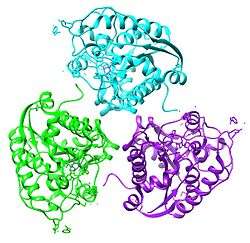ARG2
Arginase, type II is an arginase protein that in humans is encoded by the ARG2 gene.[3]
Function
Arginase catalyzes the hydrolysis of arginine to ornithine and urea. At least two isoforms of mammalian arginase exists (types I and II, this enzyme) which differ in their tissue distribution, subcellular localization, immunologic crossreactivity and physiologic function. The type II isoform encoded by this gene, is located in the mitochondria and expressed in extra-hepatic tissues, especially kidney. The physiologic role of this isoform is poorly understood; it is thought to play a role in nitric oxide and polyamine metabolism. Transcript variants of the type II gene resulting from the use of alternative polyadenylation sites have been described.
References
Further reading
- Sankaralingam, S.; Xu, H.; Davidge, S. T. (2009). "Arginase contributes to endothelial cell oxidative stress in response to plasma from women with preeclampsia". Cardiovascular Research. 85 (1): 194–203. doi:10.1093/cvr/cvp277. PMID 19684035.
- Krause, B. J.; Prieto, C. P.; Muñoz-Urrutia, E.; San Martín, S.; Sobrevia, L.; Casanello, P. (2012). "Role of arginase-2 and eNOS in the differential vascular reactivity and hypoxia-induced endothelial response in umbilical arteries and veins". Placenta. 33 (5): 360–366. doi:10.1016/j.placenta.2012.02.006. PMID 22391327.
- Sousa, M. S. A.; Latini, F. R. M.; Monteiro, H. P.; Cerutti, J. M. (2010). "Arginase 2 and nitric oxide synthase: Pathways associated with the pathogenesis of thyroid tumors". Free Radical Biology and Medicine. 49 (6): 997–1007. doi:10.1016/j.freeradbiomed.2010.06.006. PMID 20542107.
- Gotoh, T.; Sonoki, T.; Nagasaki, A.; Terada, K.; Takiguchi, M.; Mori, M. (1996). "Molecular cloning of cDNA for nonhepatic mitochondrial arginase (arginase II) and comparison of its induction with nitric oxide synthase in a murine macrophage-like cell line". FEBS Letters. 395 (2–3): 119–122. doi:10.1016/0014-5793(96)01015-0. PMID 8898077.
- Rotondo, R.; Mastracci, L.; Piazza, T.; Barisione, G.; Fabbi, M.; Cassanello, M.; Costa, R.; Morandi, B.; Astigiano, S.; Cesario, A.; Sormani, M. P.; Ferlazzo, G.; Grossi, F.; Ratto, G. B.; Ferrini, S.; Frumento, G. (2008). "Arginase 2 is expressed by human lung cancer, but it neither induces immune suppression, nor affects disease progression". International Journal of Cancer. 123 (5): 1108–1116. doi:10.1002/ijc.23437. PMID 18528866.
- Warnken, M.; Haag, S.; Matthiesen, S.; Juergens, U. R.; Racké, K. (2010). "Species differences in expression pattern of arginase isoenzymes and differential effects of arginase inhibition on collagen synthesis in human and rat pulmonary fibroblasts". Naunyn-Schmiedeberg's Archives of Pharmacology. 381 (4): 297–304. doi:10.1007/s00210-009-0489-6. PMID 20107769.
- Rodrigues Pereira, N. L.; Bandeira Moss, M.; Assumpção, C. R.; Cardoso, C. U. B.; Mann, G. E.; Brunini, T. M. C.; Mendes-Ribeiro, A. N. C. (2010). "Oxidative stress, l-arginine–nitric oxide and arginase pathways in platelets from adolescents with anorexia nervosa". Blood Cells, Molecules, and Diseases. 44 (3): 164–168. doi:10.1016/j.bcmd.2009.12.003. PMID 20071203.
- Bron, L.; Jandus, C.; Andrejevic-Blant, S.; Speiser, D. E.; Monnier, P.; Romero, P.; Rivals, J. P. (2013). "Prognostic value of arginase-II expression and regulatory T-cell infiltration in head and neck squamous cell carcinoma". International Journal of Cancer. 132 (3): E85–E93. doi:10.1002/ijc.27728. PMID 22815199.
- Fiori, L. M.; Gross, J. A.; Turecki, G. (2011). "Effects of histone modifications on increased expression of polyamine biosynthetic genes in suicide". The International Journal of Neuropsychopharmacology. 15 (8): 1161–1166. doi:10.1017/S1461145711001520. PMID 22008221.
This article incorporates text from the United States National Library of Medicine, which is in the public domain.
|
|---|
|
| Activity | |
|---|
|
| Regulation | |
|---|
|
| Classification | |
|---|
|
| Types | |
|---|
